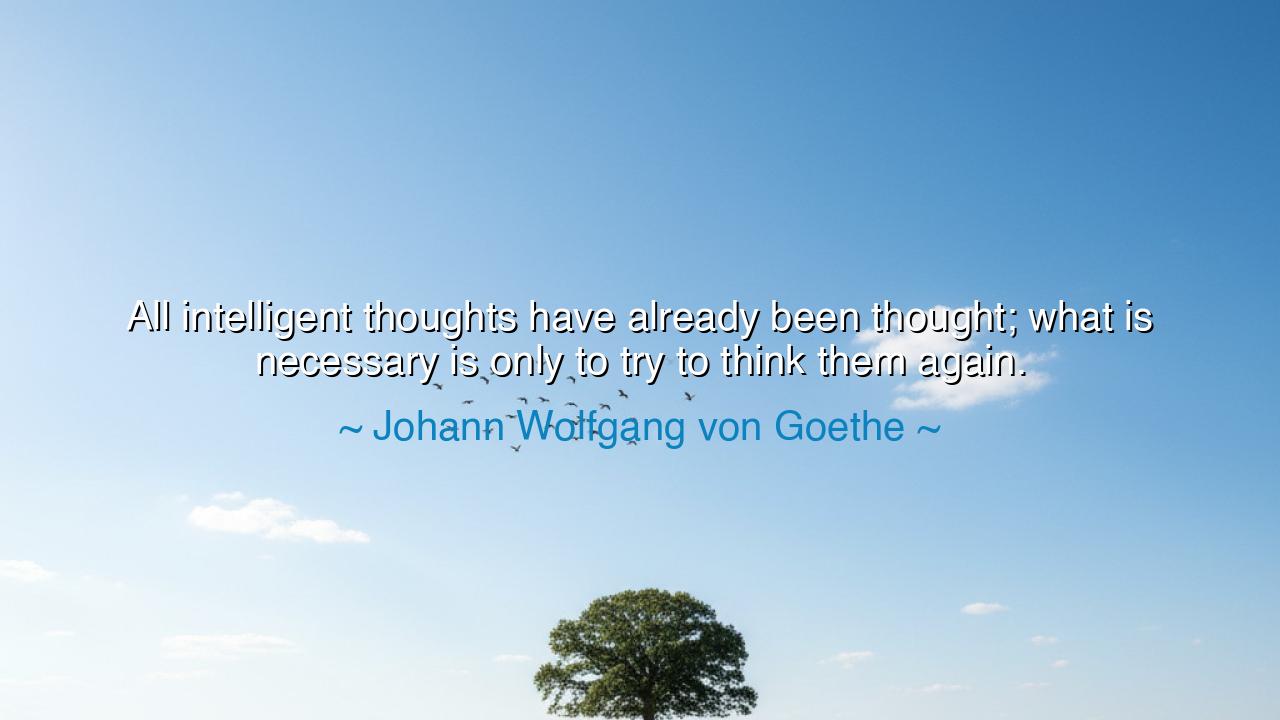
All intelligent thoughts have already been thought; what is
All intelligent thoughts have already been thought; what is necessary is only to try to think them again.






“All intelligent thoughts have already been thought; what is necessary is only to try to think them again.” Thus spoke Johann Wolfgang von Goethe, the sage of Weimar, poet of the soul, and one of the greatest minds to ever walk between the worlds of art and science. In these few words, he offers a truth both humbling and liberating — that wisdom is not the invention of new thought, but the rediscovery of eternal truths. The ideas that guide humanity — of beauty, of justice, of love, of truth — are as ancient as the stars. What each generation must do is not to create them anew, but to awaken to them again, to think them with the freshness of their own spirit, and to make them living once more in their time.
Goethe lived in an age of great awakening — the late eighteenth century, when the Enlightenment had filled the world with the fire of reason, yet the Romantic spirit longed for the return of soul and meaning. He stood at the meeting point of intellect and intuition, of science and poetry. To him, human thought was not a race for novelty, but a conversation with eternity. Every great thinker, he believed, drinks from the same well of universal truth — each adding his reflection upon the surface, but the water remains the same. Thus, when Goethe said that “all intelligent thoughts have already been thought,” he was not lamenting the end of creativity, but celebrating the continuity of human understanding.
For what is thought, if not the endless echo of the divine within the human mind? The truths of existence — the beauty of kindness, the necessity of courage, the longing for meaning — do not belong to any single age. They are archetypes that return again and again, clothed in new language, new experience, new life. The philosophers of Greece pondered them; the prophets of the East sang of them; the poets of every land have shaped them into song. Yet they are the same truths reborn. What matters is not that we think something “new,” but that we feel the old truths deeply enough to make them our own — that we, too, awaken to the eternal wisdom that sleeps in us.
Consider the story of Socrates, who claimed that he taught nothing, but only helped others to remember what their souls already knew. His student Plato called this the doctrine of anamnesis — that all learning is but remembrance. Every truth we “discover” is not a creation, but a recollection of what the soul has always known. So too with Goethe’s words: the task of the thinker, the artist, the seeker, is not to chase after newness for its own sake, but to awaken again the ancient fires of truth — to think what has been thought, but to think it as if for the first time, with the full force of one’s own experience.
Look also to the life of Isaac Newton, who, when praised for his discoveries, humbly said, “If I have seen further, it is by standing on the shoulders of giants.” Newton knew, as Goethe did, that every great thought is born not from isolation, but from communion with the past. The ideas of gravity, light, and motion were not his alone — they had been glimpsed by minds before him. What he did was see them anew, refine them, and bring them to clarity in his age. Thus, the progress of thought is not the invention of new truths, but the deepening of old ones — a vast cathedral built stone by stone by countless generations of thinkers.
Goethe’s teaching, then, is not a call to resignation, but to participation in the timeless work of understanding. Each person is invited to think deeply, not because their thoughts must be new to be worthy, but because they must be true to be living. The same truths that guided the ancients must be rediscovered in every age, lest they fall into forgetfulness. When a man questions himself with sincerity, when a woman contemplates beauty or justice or love with her full heart, they are not imitating the wisdom of the past — they are joining it, becoming a living part of the same stream that has always flowed through humanity.
And so, dear listener, take this as both comfort and command: do not fear that your thoughts are unoriginal. The mind that seeks truth stands among the immortals. Think deeply, and you will find yourself conversing with the great souls of history. Read the old works not as relics, but as companions in your own awakening. Let your reflection breathe new life into their wisdom, and in doing so, keep the eternal dialogue alive. For the purpose of thought is not novelty, but revelation — the moment when an old truth becomes new in the light of your own understanding.
Thus remember Goethe’s words: “All intelligent thoughts have already been thought; what is necessary is only to try to think them again.” Do not chase the illusion of being the first, but the power of being authentic. Think sincerely, live mindfully, and let your reflection be your own contribution to the eternal flame of human wisdom. For it is not the first thinker who matters, but the one who, in every age, thinks with wonder, and by thinking, keeps the light alive.






AAdministratorAdministrator
Welcome, honored guests. Please leave a comment, we will respond soon